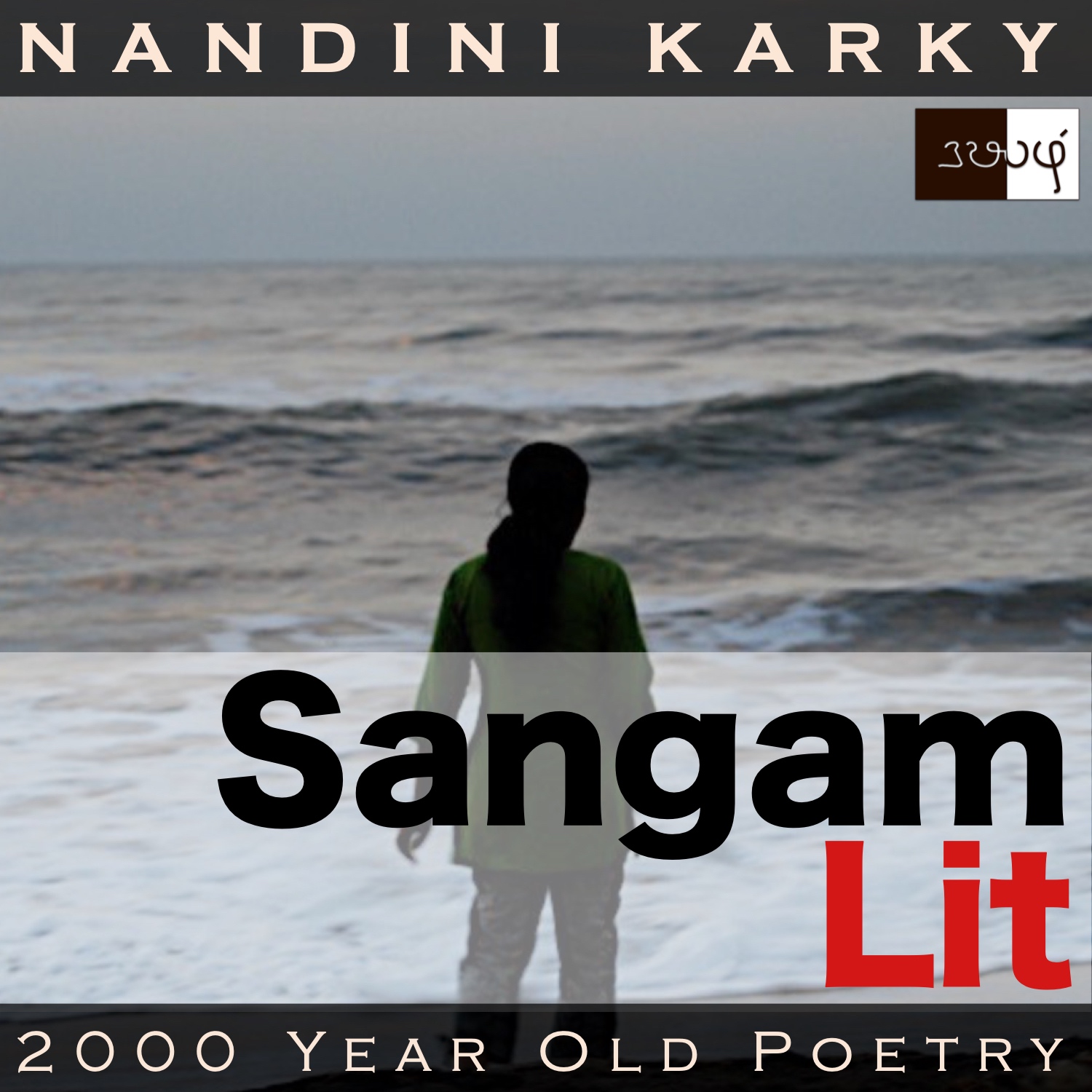Podcast: Play in new window | Download
Subscribe: Apple Podcasts | Spotify | Amazon Music | Android | iHeartRadio | Email | TuneIn | RSS | More

In this episode, we travel to an ancient town by the sea and witness a scene of parting, as portrayed in Sangam Literary work, Natrinai 130, penned by Neythal Thathanaar. Set in the coastal landscape of ‘Neythal’, the verse speaks in the voice of the lady to the confidante, expressing the inconsolable sadness in her heart.
வடு இன்று நிறைந்த மான் தேர்த்தெண் கண்
மடிவாய்த் தண்ணுமை நடுவண் ஆர்ப்ப,
கோலின் எறிந்து காலைத் தோன்றிய
செந் நீர்ப் பொது வினைச் செம்மல் மூதூர்த்
தமது செய் வாழ்க்கையின் இனியது உண்டோ?
எனை விருப்புடையர் ஆயினும், நினைவிலர்;
நேர்ந்த நெஞ்சும் நெகிழ்ந்த தோளும்
வாடிய வரியும் நோக்கி, நீடாது,
”எவன் செய்தனள், இப் பேர் அஞர் உறுவி?” என்று
ஒரு நாள் கூறின்றுமிலரே; விரிநீர்
வையக வரையளவு இறந்த,
எவ்வ நோய்; பிறிது உயவுத் துணை இன்றே.
The poem opens with the words ‘வடு இன்று’ meaning ‘faultless’ and seeing ‘மான்’ close by, at first glance we may think it’s a ‘deer’ that’s being talked about. But the next word ‘தேர்’ meaning ‘chariot’, makes us realise that it was a ‘horse’ being highlighted. For, there are surely no ‘Santas’ in this part of the world! Next, we meet up with this new word ‘தண்ணுமை’, which is the ancient Tamil name for the contemporary Indian percussion instrument ‘mridangam’. ‘கோல்’ appears in the meaning of a ‘horse whip’ here. The reference to an ‘ancient town’, மூதூர் makes an appearance again and I can’t help wondering how ancient? How many such ancient towns have been wiped out without a trace, under the crushing wheels of modernity! The cities we live in and celebrate today, wonder what they will be or will they even be, in another two thousand years! Changing gears, we head back to see ’பேர் அஞர் உறுவி’ meaning ‘the epitome of great sorrow’ and ‘விரிநீர்’, ‘vast seas’. Let’s sail these ancient seas to reach the mind of that suffering lady.
The man and lady have been living a happy married life and circumstances arise such that the man parts from the lady to gather wealth. Being the dutiful wife that she is, she bids him farewell. Days go by and the lady languishes in the pain of separation. The confidante tries to console the lady but the lady refuses to accept her words saying, “On a chariot tied with impeccable horses, as the leather-clothed drums, with a clear sound, resounded intermittently, cracking the horse whip, my excellent man invested in the common good, left on a fresh morning. Could there be anything more pleasant than a happy married life in this ancient town that he left? Although he loves me, he thinks not of me! Without delay, with consideration for my heart that accepted this fate, my shoulders that have thinned down and my diminished form, did he send a message any day, wondering, ‘What could that girl be doing, the one filled with great sorrow?’ Nay! My despairing affliction extends beyond the limits of this sea-covered earth. Alas! There could be no other consoling mate who can slay this sadness!” With these words, the lady expresses the angst in her heart at receiving no message from the man, who has parted away.
Reflecting, we hear a horse neighing, drums beating and a whip cracking! Those sounds that fill the air as the man prepares to leave the lady on his mission to gather wealth. They already have enough wealth to possess an impeccable horse, we see! Being a man of prominence, the town too sends him off with thundering drum beats, bidding him success in his journey. So, it’s no wonder that the lady asks what could be better than a life together in that ancient town. Why must the man leave, wanting more and more of that wealth that they already possess? But turns out this is a man interested in the common good. So perhaps he leaves so that he may have enough to give to the needy. The lady seeing this attribute in the man accepts her fate and sends him on his journey. But, that’s for the outer world! Her inner world soon turns barren and the mind’s dryness overflows to change her physical form. Her shoulders wane and her skin withers. Beyond all this, the thing that torments her the most is that the man sends no word back to her. Shouldn’t he realise her painful state and send a concerned word somehow?
Seeing all this, the lady concludes, ‘He does love me but he thinks of me not!’ A single line that speaks so much. Never does she doubt his love for her but only sees that his mind is occupied elsewhere. Such is the understanding of this lady, who declares that the waves of her sadness rise even beyond the limits of this earth, hemmed by oceans. Here’s wishing those waves wash that man’s heart on a faraway shore and bring back the consolation she seeks!




Thank you so much for your Amazing work please keep writing ???????? much love to you